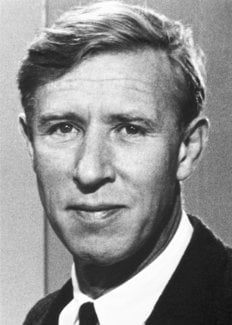Konrad Bloch
Biographical

Konrad E. Bloch was born on 21st January 1912, in Neisse, Upper Silesia, then Germany, the son of Fritz Bloch and his wife Hedwig, née Striemer. He attended the elementary school and the Real gymnasium in the same city and in 1930 went to Munich to study chemistry at the Technische Hochschule. He became soon attracted to organic chemistry, especially the structure of natural products, an interest which he owed in large measure to the inspired teaching of Hans Fischer. Another influential experience was to attend the Sessions of the Münchener Chemische Gesellschaft and to hear the great organic chemists of the time, Adolph Windaus, Heinrich Wieland and Rudolf Willstätter report their researches on steroids, porphyrins and enzymes.
For racial reasons his studies in Munich ended in 1934 after he had obtained the degree of Diplom-Ingenieur in Chemistry. Leaving Germany Bloch was fortunate to find a temporary position at the Schweizerische Forschungsinstitut in Davos, Switzerland. His assignment there was to investigate the phospholipids of tubercle bacilli, his first exposure to biochemical research.
In 1936 Bloch was able to immigrate to the United States as he had long hoped. On advice by the late Max Bergmann and with the generous support of the Wallerstein Foundation, he entered the Department of Biochemistry, College of Physicians and Surgeons, Columbia University, where he became a graduate student under Hans T. Clarke. Research leading to the Ph.D. degree was completed in 1938. Rudolf Schoenheimer then asked Bloch to join his research group. The first few years spent at Columbia with Schoenheimer and his associate David Rittenberg were certainly the most influential of his «Lehrjahre». This period more than any other developed his lasting interest in intermediary metabolism and problems of biosynthesis. During that time (in 1942) Bloch in collaboration with David Rittenberg initiated the work on the biological synthesis of cholesterol which was to occupy his research interests for nearly twenty years.
In 1946 Bloch moved to the University of Chicago as Assistant Professor of Biochemistry. Appointments to Associate Professor and Professor followed in 1948 and 1950, respectively. At Chicago, in the Biochemistry Department headed by E. A. Evans Jr., the intellectual climate was stimulating and the conditions ideal for the development of young investigators. Work on cholesterol, biosynthesis was continued and progressed well with the aid of able and enthusiastic students. During the years at Chicago Bloch also investigated (with J. Snoke) the enzymatic synthesis of the tripeptide glutathione. As a Guggenheim fellow in 1953 he spent a highly rewarding year at the Organisch-Chemisches Institut, Eidgenössische Technische Hochschule in Zurich with L. Ruzicka, V. Prelog and their colleagues. The biogenetic considerations on terpene-sterol relationships developed by the Swiss at that time provided rich inspiration for the experimental work in his own laboratory after his return to the United States.
In 1954 Bloch was appointed Higgins Professor of Biochemistry in the Department of Chemistry, Harvard University, and in 1968 he became Chairman of the Department. Apart from continuing research on various aspects of terpene and sterol biogenesis, he has become interested in the enzymatic formation of unsaturated fatty acids and more recently in various aspects of biochemical evolution.
Professor Bloch is a member of the American Chemical Society, National Academy of Sciences U. S., American Academy of Arts and Sciences, American Society of Biological Chemists, Harvey Society, American Philosophical Society, a honorary member of the Lombardy Academy of Sciences, and a Senior Fellow of the Australian Academy of Science. He was President of the American Society of Biological Chemists (1967), Chairman of the Section of Biochemistry, National Academy of Sciences (1966-1969), and Chairman of the National Committee for the International Union of Biochemistry (1968).
Dr. Bloch has been honored as recipient of the following medals and awards: Medal of the Société de Chimie Biologique (1958), Fritzsche Award (American Chemical Society, 1964), Centennial Science Award (University of Notre Dame, 1965), Cardano Medal (Lombardy Academy of Sciences, 1965), Distinguished Service Award (University of Chicago School of Medicine, 1964), William Lloyd Evans Award (Ohio State University, 1968). He holds honorary doctor degrees from the universities of Uruguay (1966), Brazil (1966), Nancy (1966), Columbia University (1967), Technische Hochschule, Munich (1968), and Brandeis University (1970).
In 1941 Konrad Bloch married Lore Teutsch, a native of Munich. They have two children, Peter, and Susan.
This autobiography/biography was written at the time of the award and first published in the book series Les Prix Nobel. It was later edited and republished in Nobel Lectures. To cite this document, always state the source as shown above.
Konrad Bloch died on October 15, 2000.
Nobel Prizes and laureates
Six prizes were awarded for achievements that have conferred the greatest benefit to humankind. The 14 laureates' work and discoveries range from quantum tunnelling to promoting democratic rights.
See them all presented here.
